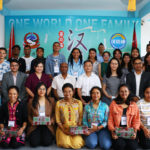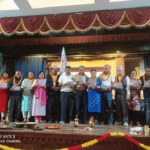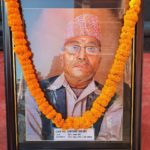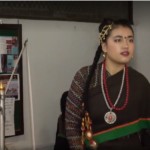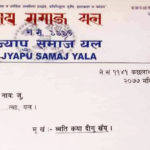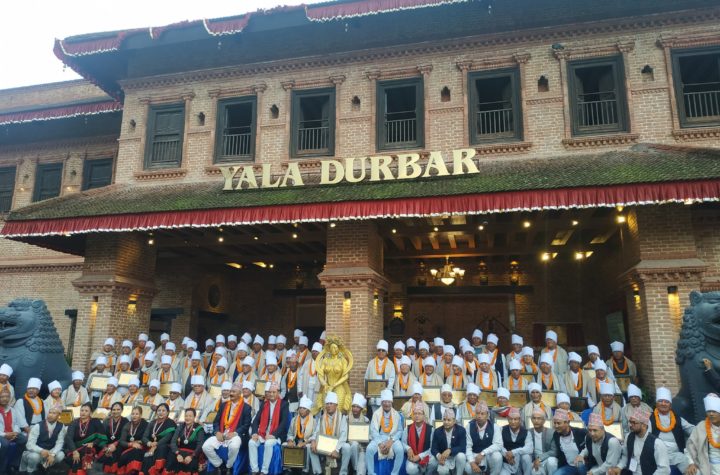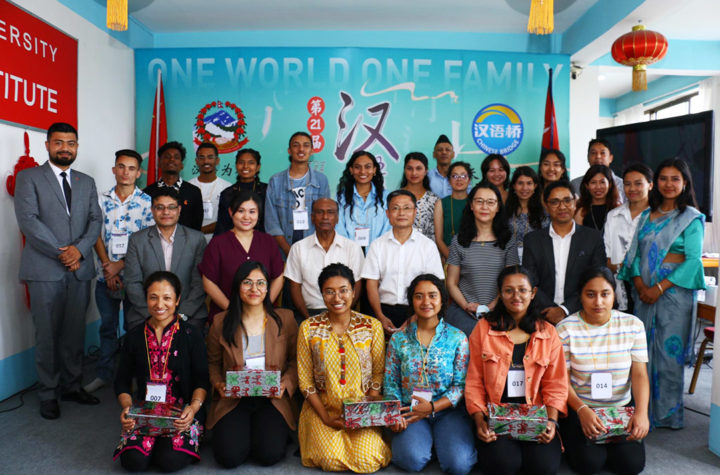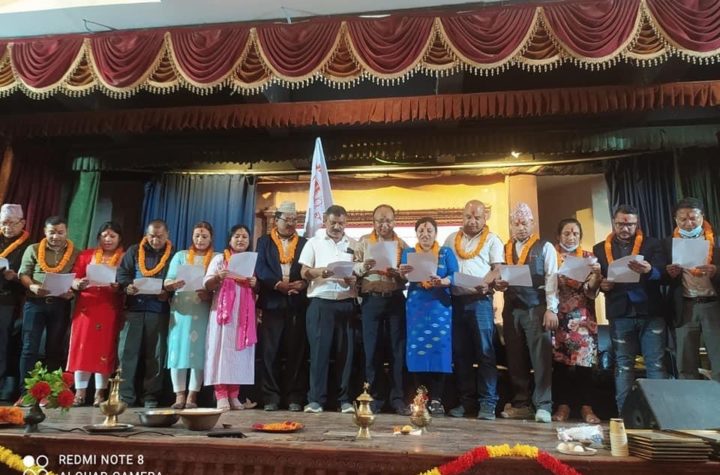
Nepal has glorious past and priceless heritage to boast about. Geographically, the land of Mt. Everest and the cradle of two major religions – Buddhism and Hinduism and historically from birth of Buddha to the reign of Ranas, the kingdom of monarchs to a being a federal democratic republic recently, Nepal has seen it all. Nepal’s tryst with the history has caused a unique devel-opment of cultural legacy and has left many witnesses in the form of art and articrafts.
With historical awakening of ethnic recognition of the aboriginals of the country, it is a welcoming progress that the country has assured the equality and equity of all the ethnic groups in the upcoming constitution. It is, therefore, all the more respectful that local community stake in nation building has increased, creating identity based institutions to upkeep their own historic cultural lifestyles instead of just waiting to be preserved in museums as urbanization rapids its development.


Among the ethnic groups of Nepal, Newah community in the valley and beyond is one of the richest that has pre-vailed and preserved its beauty through arts, articrafts and cultural lifestyle. Newah are a multi-ethnic, linguis-tic and cultural community of Indo-Aryan and Tibeto-Burman ethnicities. Scholars have also described the Newars as being a nation and among them, the Jyapus (farmers) are the indigenous ones.
Jyapu Samaj is one of such leading social organization in Lalitpur district estabhished in Nepal Era 1114, 25th Bhadra 2051 (September 10, 1994) with a mission to preserve and develop ethnic language, culture and to guarantee the social, economic and political rights of more than thirty thousand indigenous Jyapu population within Yala – Patan.
With a mission to “Enliven our art and culture” Jyapu Samaj has strived to retain good ethics and practices that represent its aboriginal history with progressive acceptance of global modern development. It has orga-nized and mobilized all its members as social volunteers to manage historical cultural events, rituals and festi-vals, thus contributing in development of social harmony by maintaining peace while discouraging social evils among the citizen of Patan.

Essence of Ethinic Community Museum
Essence of Ethinic Community Museum
‘Museums enable people to explore collections for inspiration, learning and enjoyment. They are institutions that collect, safeguard and make accessible artefacts and specimens, which they hold in trust for society.’ – Museums Association Definition (adopted: 1998)
Jyapu Samaj has further stepped up as an institution to collect, safeguard and assist accessing of the local ethnic Newah artefacts for the generations to come. Adding on to glorious history of museums in Nepal, it has initiated establish-ment of additional ethnic museum within its academy building infrastructure. The first phase of the museum is complete and all historic wit-nesses have been protected in the museum inlcuding arts and articrafts reflecting Newah culture and its 10 karmic customs are protected with great effort. Indeed you will appreciate the works done, in the extreme financial constraint, by the Jyapu Samaj till date.
Hightlights:
1.Lifesize models depicting lifestyle, vocation and cultural events of national importance
2.Mlniature handicraft model of indigenous ethnic people found in Nepal and major cultural festivals of Newah commu-nity.
3. Samples of various soil found in the valley
4. Samples of food grains, beans and lentils cultivated in the valley and beyond
5. Vocational instruments
6. Local farming tools used by households
7. Traditional ornaments and dresses
8. Musical instruments of cultural value
9. Display of items used in
10 Karmic rituals
10. Samples of seasonal festive food culture
11. Samples of art culture reflecting vocation of ‘Chitrakar’ caste in Newah community
12. Demonstration of wooden bridge and brick architecture
Features of the Museum
Features of the Museum
The physical infrastructure – Jyapu Academy Hall, is in itself, a model depicting rich traditional Newari Archi-tecture. Ethnic Community Museum in it, is a showcase of a wide range of collected articrafts, most of which are, still in use in local households such as kitchen cut-leries and storage utensils known to have been in exis-tence since hundreds of years.



Objectives of the Museum

• Establish Jyapu museum as a new tourist destination to increase local participation in tourism sector thus creating new job opportunities for community people.
• Establish documented database of archived artifacts and historic materials related to ethnic Newah commu-nities
• Promote lifestyles of Jyapus and Newar community at national and international arena.
• To aid in continuation of good cultural practices of ancient civilization to the future generation and retain indegenous identity despite rapid urbanization of the valley
• Influence encouraged youth participation in conserva-tion and documentation of traditions, lifestyle, art and music backed up by resourceful scholars for further academic research on Newah community
• To develop the museum as a perpetual source of income for self sustainable operation of Jyapu Samaaj activities and its Academy.
Location

Patan Museum to Jyapu Museum
(5 minutes walking distance towards the North-East from Patan Durbar Square Area)
Museum Future Plans – A way to help:
With initiation of the ethnic museum, there is much more to be done. Jyapu Samaj has prioritized following upgrading activities for the museum and assistance of all kinds including your technical support are heartily welcome:
• Establish a financial trust for funds to purchase arti-facts that aren’t available locally as gifts.
• Form a managing committee including a museum expert and allocate additional manpower required
• Introduce Live Demonstrations of various crafts at work along with retail interactive workshops with local crafts-men and artists at the top floor Dalaans of the building.
• Include life history of historically important people
• Addition of documents and manuscripts about tradi-tional livelihood of the community
• Encourage local clubs and residents for collecting tra-ditional items and goods suitable for exhibiting.
• Use latest technologies to set up an interactive TV screen with a head phone set against the wall to gain further information of exhibits. The visitors will be able to promptly find details on items of their interest includ-ing images and description in several languages of their choice: Nepalbhasa, Nepali, English, Chinese, Japanese, French, German, and Spanish.
• Enclose exhibits in clear transparent glass to protect them from dust and dirt.
• Telia tile flooring to reflect and promote traditional brickwork and masonry
• Add provisions of lock-up or vaults room for storing important artifacts.
• Documentation of the donors of exhibits.
MAINTENANCE & OPERATION
1.Jyapu Samaj holds the responsibility of maintaining and operating the building.
2.The initiation of ethnic community museum and the Jyapu Academy is to establish a new inclusive cultural heritage. Moral, technical and financial support are expected from all sectors including governement, inter-national agencies and local stakeholders to conserve the museum.
3. Provisions of facilities within the infrastructure such as auditorium and banquet halls are available for local, national and international seminars and functions. The income generated from the museum and seminar hall will go in conservation and sustainable growth practices via central fund of the Jyapu Samaj.

